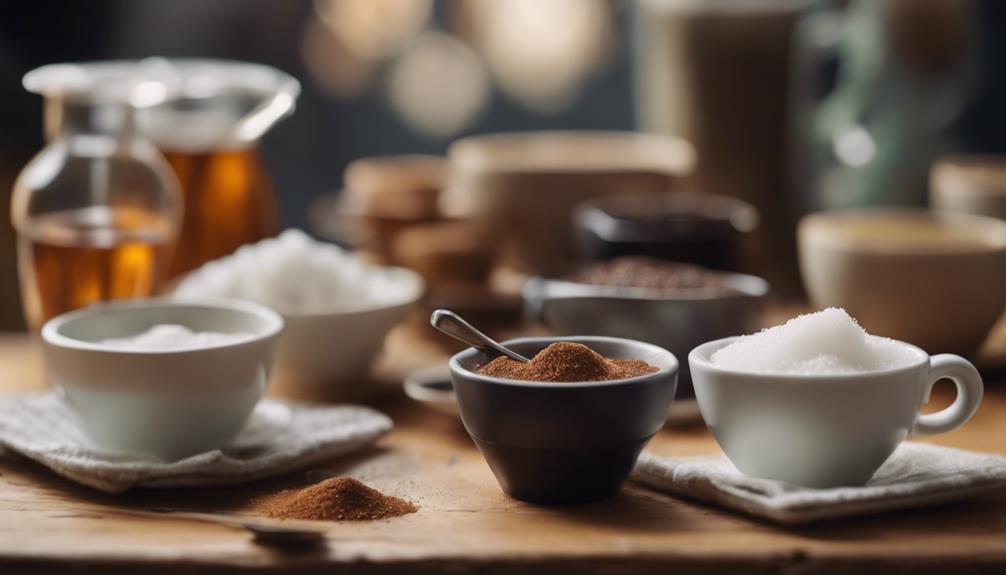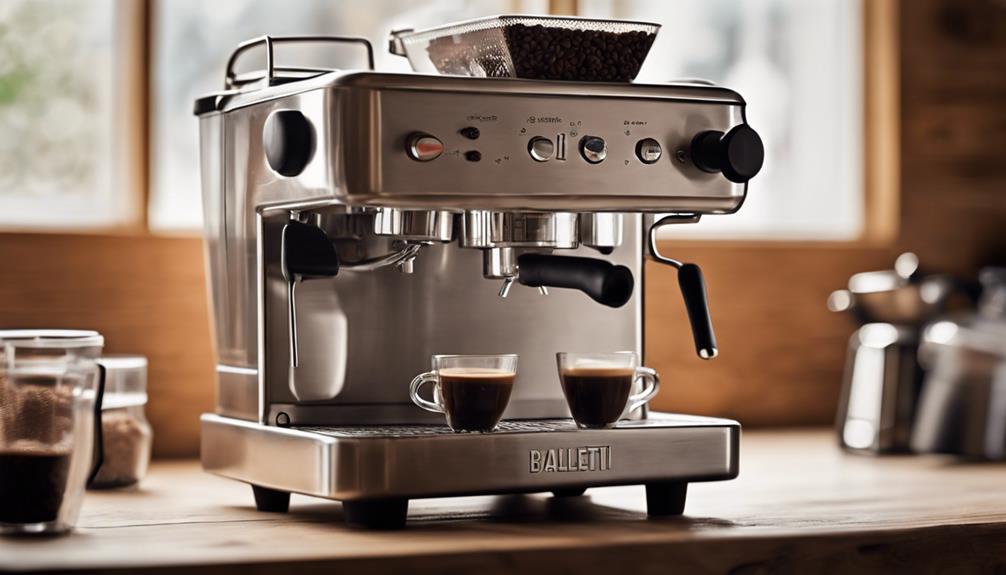In espresso, whether or not to add sugar is a personal preference, not a requirement. Sugar can help balance out the bitterness, enhance flavors, and cater to different taste preferences. While high-quality espresso may not need sugar, it is important to consider the health implications of consuming too much sugar. There are various sugar alternatives available for customization, and cultural influences can also affect how people sweeten their espresso. Adjusting the sugar levels in your coffee can help you refine your overall experience. Ultimately, the choice to add sugar to espresso depends on your own palate and background. Take a closer look at how sugar can impact your espresso enjoyment.
Key Takeaways
- Espresso doesn't need sugar for flavor, but adding sugar can balance bitterness and enhance taste.
- Personal preference dictates the need for sugar in espresso.
- Balancing sweetness and bitterness is a common practice with espresso.
- High-quality espresso may not require sugar to enjoy its full flavor.
- Experimenting with sugar levels can help customize the espresso experience.
Pros and Cons of Adding Sugar
Adding sugar to espresso can greatly impact its taste profile, influencing both the flavor and overall experience for the drinker. Sugar, when added to espresso, can make the coffee taste less bitter and more enjoyable. It plays a crucial role in balancing out the natural bitterness of espresso, creating a smoother and more palatable drink.
Some coffee enthusiasts believe that adding sugar to espresso can enhance its flavor by complementing nutty or chocolaty notes, resulting in a well-rounded taste experience. However, others prefer their espresso without sugar to fully appreciate the natural flavors of the coffee.
Adding sugar in moderation when it comes to espresso is important to avoid overpowering the coffee's taste. Ultimately, the decision to sweeten your espresso with sugar is a personal preference that varies among individuals based on their unique taste preferences. Finding the right balance is key to making a good cup of espresso that suits your palate.
Sweetness Vs. Bitterness

To balance the bitterness of espresso, considering the contrast of sweetness can enhance your overall flavor experience. Espresso naturally carries a level of bitterness and acidity, which can be tempered by adding a touch of sugar.
The addition of sugar can elevate the flavor profile by harmonizing with the espresso's inherent bitterness. It's a matter of personal preference whether you choose to add sugar, as some enjoy the bittersweet experience created by the combination of sweetness and bitterness in espresso.
For high-quality espresso made with fresh beans and precise techniques, the need for sugar to mask any harsh or bitter notes may be unnecessary. However, in Italian culture, it's common practice to add sugar to espresso, creating a unique bittersweet taste that's cherished by many.
Ultimately, the decision to balance the sweetness and bitterness in your espresso is a personal choice that can vary based on individual preferences and cultural influences.
Impact on Coffee Flavor Profile

Understanding the impact on the coffee flavor profile is crucial when considering adding sugar to espresso. Some argue that a touch of sugar can enhance the overall flavor, akin to how a pinch of salt can elevate food.
Adding sugar can potentially disrupt the balance between sweetness and bitterness in espresso. Appreciating the intricacies of espresso brewing is essential to determine whether sugar complements or detracts from the natural flavors of the coffee.
Sugar and Bitterness
Sugar can play a significant role in shaping the flavor profile of espresso by interacting with its inherent bitterness. When adding sugar to espresso, it can mask the bitterness, making the coffee taste great for those who prefer a sweeter flavor.
By balancing out the bitterness with sweetness, sugar can alter the overall taste experience of espresso. Some individuals believe that a well-brewed espresso shouldn't require sugar to enhance its flavor profile.
Additionally, the interaction of sugar with the acidity in espresso can either enhance or mask the acidity based on personal preference. Ultimately, the decision to add sugar to espresso comes down to individual taste preferences for sweetness and bitterness.
Experimenting with sugar in espresso can help you find the perfect balance that suits your palate, enhancing the overall coffee-drinking experience according to your liking.
Sweetness Balance
Achieving the perfect balance of sweetness in your espresso can greatly impact the overall flavor profile of the coffee. The sweetness balance in espresso is nuanced and complex.
While adding sugar can enhance flavor, it may also mask subtle nuances of the coffee. To avoid a harsh or bitter taste, using fresh beans and mastering proper brewing techniques are essential.
In drinks like cappuccinos, the microfoamed milk contributes natural sweetness that complements the espresso. Much like how a touch of salt can enhance the flavors in food, a hint of sugar can do the same for espresso, enhancing its taste profile.
The proper technique in creating microfoamed milk ensures that it has inherent sweetness, which pairs well with the coffee. By understanding and manipulating the sweetness balance in your espresso, you can reveal a world of flavors that harmonize to create a delightful coffee experience.
Flavor Enhancement
To enhance the flavor profile of espresso, consider the impact of flavor enhancement techniques such as adding sugar to espresso and properly frothing milk on the overall taste experience.
When it comes to flavor enhancement, adding sugar to espresso can be a double-edged sword. While a touch of sugar can enhance the flavor by providing a balance of sweetness, it can also mask the subtle nuances of the coffee's taste profile.
Freshly roasted beans and mastering proper brewing techniques can prevent espresso from tasting harsh or bitter, allowing the natural flavors to shine through.
Additionally, microfoamed milk in drinks like cappuccinos can offer a natural sweetness that complements the espresso without the need for added sugar.
Ultimately, the decision to add sugar for flavor enhancement boils down to personal preference. Just like salt enhances flavors in food, a hint of sugar can elevate the taste of espresso, but the best results often come from a well-balanced and properly brewed cup of coffee.
Health Considerations and Moderation

In maintaining a healthy lifestyle, it's essential to be mindful of the impact of added sugars on your overall well-being. Excessive sugars can lead to detrimental effects on health, such as an increased risk of obesity and diabetes.
When it comes to enjoying an espresso, moderation is key. The recommended amount of sugar in an espresso typically ranges from 2-4 grams to balance flavor without causing significant health concerns. It's important to be aware that other popular foods like low-fat yogurt, granola, and sports drinks can contain much higher sugar content in comparison.
Sugar Alternatives for Espresso

When considering sugar alternatives for your espresso, popular options like stevia, erythritol, and monk fruit offer a healthier choice with minimal impact on blood sugar levels.
Additionally, artificial sweeteners such as aspartame and saccharin can be used to sweeten your espresso.
Sugar-free syrups like vanilla or caramel provide a flavorful alternative that doesn't rely on traditional sugar.
Sweetening Espresso Naturally
Consider sweetening your espresso naturally by exploring a variety of sugar alternatives that can enhance the flavor without the need for traditional sugar. Options like honey, agave nectar, maple syrup, and flavored syrups provide a natural sweetness to your espresso without the drawbacks of refined sugar.
For those looking to cut down on calories, Stevia and monk fruit sweeteners are excellent sugar-free choices that still deliver a satisfyingly sweet taste. If you prefer natural alternatives, coconut sugar and date sugar offer unique flavor profiles that can complement the richness of espresso.
Additionally, adding a pinch of salt to your espresso can help enhance sweetness and balance out the flavors, providing a subtle yet effective way to reduce the need for sugar. Experimenting with these different sugar alternatives can help you discover the perfect balance of sweetness for your espresso, tailored to your preferences.
Healthier Sugar Options
Explore healthier sugar options to sweeten your espresso, such as Stevia, monk fruit sweetener, agave nectar, coconut sugar, and honey, offering a range of benefits for a more nutritious caffeine boost.
Stevia is a sugar substitute known for being a natural alternative that can sweeten your espresso without adding extra calories.
Monk fruit sweetener is a great choice for those looking to cut down on sugar intake since it contains zero calories.
Agave nectar, with its low glycemic index, provides a sweetening option that won't cause sudden spikes in blood sugar levels, making it a healthier alternative for your espresso.
Coconut sugar, rich in nutrients and minerals, can add a touch of sweetness to your espresso while offering some health benefits.
Honey, another natural sweetener, not only sweetens your espresso but also brings along antioxidants and antibacterial properties, enhancing the nutritional value of your drink.
Consider these sugar alternatives for a healthier way to enjoy your espresso.
Cultural Perspectives on Sweetening Espresso

Cultural attitudes towards sweetening espresso vary greatly across different regions and communities. In Italy, adding sugar to espresso is a deeply ingrained cultural practice. Italians believe that sugar enhances the flavor of espresso and helps balance out its inherent bitterness. This tradition stems from the idea of catering to individual preferences in sweetness levels, allowing each person to enjoy their coffee in a way that suits their taste.
On the other hand, in North America, some baristas may discourage the addition of sugar to espresso. This is influenced by differing cultural perceptions that prioritize the purity of coffee flavors without any added sweetness.
However, for many, sugar serves to soften the bitterness of espresso, making it more palatable and enjoyable. Ultimately, the decision to sweeten espresso with sugar is a personal one, shaped by individual taste preferences and cultural influences that contribute to the diverse ways coffee is enjoyed worldwide.
Experimenting With Sugar Levels

To achieve the perfect balance of flavors in your espresso, experimenting with different sugar levels can greatly impact your overall coffee experience. Sugar levels play an important role in altering the taste of your espresso, ranging from enhancing sweetness to potentially making it bitter.
By taking the time to experiment with sugar levels, you can find your preferred balance that complements the natural flavors of the coffee without overpowering them.
Adding just the right amount of sugar can enhance your experience of drinking espresso, providing a subtle sweetness that harmonizes with the coffee's profile. However, it's crucial to be mindful of not adding too much sugar, as this can mask or overpower the intricate flavors present in the espresso.
Understanding how sugar levels affect your espresso can lead to a more enjoyable and personalized coffee experience. So, don't be afraid to play around and discover the perfect sugar level that elevates your espresso enjoyment.
Frequently Asked Questions
Do Italians Drink Espresso Without Sugar?
Italians often enjoy espresso with sugar to enhance the flavor and balance its bitterness. While some Italians prefer their espresso without sugar, adding a touch of sweetness is a prevalent cultural practice.
The tradition of adding sugar to espresso dates back to the invention of this concentrated coffee. Overall, it's common in Italy to find espresso paired with a hint of sugar, but individual preferences may vary.
Is Espresso Without Sugar Good for You?
Espresso without sugar can be a beneficial choice for you. By skipping the sugar, you can fully appreciate the intricate flavors and nuances of the coffee. Professional tasters recommend this approach to truly savor the essence of the brew.
Opting for sugar-free espresso can help you develop a more refined palate, distinguishing between various coffee origins and roasting styles. Ultimately, enjoying espresso without sugar can lead to a more authentic and rewarding coffee-drinking experience.
Do Baristas Add Sugar to Coffee?
Baristas typically offer sugar as an option for customers to add to their coffee. It's a common practice in some regions like Italy but may vary based on cultural norms.
Respecting customers' preferences is key, whether they choose to sweeten their coffee or not. Ultimately, adding sugar to coffee is a personal choice that can enhance the overall coffee-drinking experience.
Be sure to communicate your preferences to the barista when ordering your espresso.
How Can I Sweeten My Espresso?
To sweeten your espresso, consider adding a small amount of sugar, typically 2-4 grams. This can enhance the coffee's flavor profile without overpowering it.
Sugar complements nutty, chocolaty, or slightly bitter notes in espresso, aligning with Italian traditions. Not all coffees benefit from sugar, so choose your beans wisely.
Moderation is key for health, aiming for 2-4 grams per serving. Enjoying sweetened espresso can be a delightful occasional treat while being mindful of sugar intake overall.
Does Adding Espresso to Cold Brew Require Adding Sugar?
When considering the role of espresso in cold brew, it’s important to note that adding espresso to cold brew does not necessarily require adding sugar. The espresso can add a rich, strong flavor to the cold brew without the need for additional sweetener, depending on personal preference.
Does Adding Water to Espresso Change the Need for Sugar in the Drink?
Adding water to espresso can actually enhance the natural flavors and aromas of the coffee, reducing the need for sugar. The benefits of water with espresso include a smoother, less bitter taste, making it more enjoyable for those who prefer their coffee without added sweetness.
Conclusion
To sum up, adding sugar to espresso is a personal choice that can enhance or detract from the overall flavor experience. Like a delicate balance beam, the decision to sweeten your espresso should be approached with caution and mindfulness.
Consider your preferences, health concerns, and cultural influences before reaching for the sugar bowl.
Ultimately, the choice is yours to make, but remember that moderation is key in maintaining a harmonious coffee experience.









